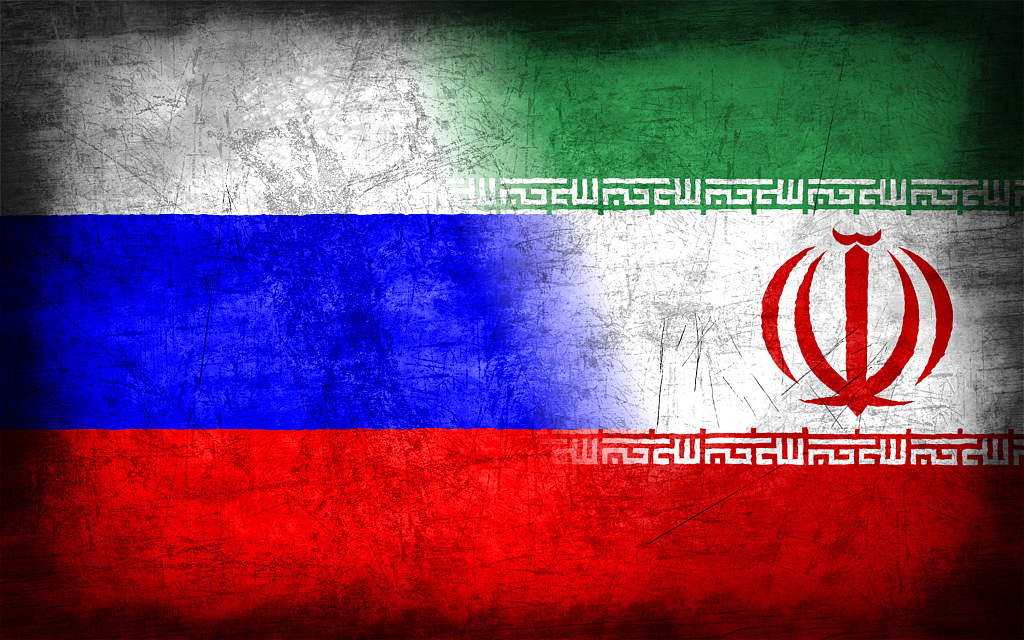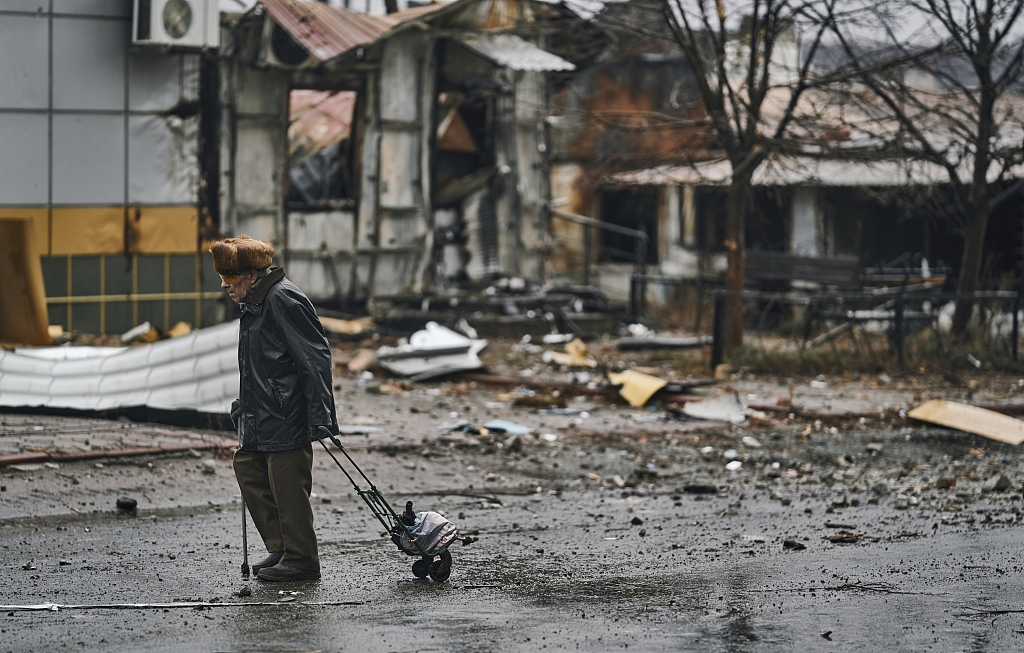
Editor's note: Abhishek G Bhaya is a senior journalist and international affairs commentator. The article reflects the author's opinions and not necessarily the views of CGTN.
Ever since the Russia-Ukraine conflict broke out in February this year, the U.S. and its European allies have pumped billions of dollars' worth of weapons and military equipment into Ukraine. The weapons include artillery, anti-aircraft weapons, anti-tank weapons, armored vehicles, reconnaissance and attack drones, helicopters, small arms, ammunition and body armor.
Twenty-five of the 28 nations providing military assistance to Ukraine are NATO members, including the U.S. and UK, which have supplied Kyiv with sophisticated weapons such as multiple rocket launch systems (MLRS). Meanwhile, the U.S. confirmed last week that it is finalizing plans to send the Patriot defense system to Ukraine.
Compare the magnitude of Western military supplies to Ukraine with recent reports about Iran exporting a paltry 400 attack drones to Russia that Moscow has deployed in its war against Kyiv since August, and the raging disproportionate outrage emanating from Washington.
Last month, Iranian Foreign Minister Hossein Amir-Abdollahian admitted that Tehran supplied drones to Russia but said they were delivered before the war in Ukraine. "This fuss made by some Western countries that Iran has provided missiles and drones to Russia to help the war in Ukraine – the missile part is completely wrong," the official IRNA news agency quoted him as saying. "The drone part is true and we provided Russia a small number of drones months before the Ukraine war."
CIA chief William Burns told PBS television on Friday that the military cooperation between Iran and Russia "poses real threats" to U.S. allies in the Middle East. White House national security spokesman John Kirby on December 9 called the Tehran-Moscow military partnership "harmful" to Ukraine, Iran's neighbors and the world. American and Western analysts have argued that Iran's export of drones to Russia will lead to more proliferation and poses danger to the entire globe.
This begs a genuine dilemma in the minds of neutral observers. Are U.S. and Western weapons supplies to allies beyond the ambit of proliferation? Does proliferation happen only when non-Western countries buy and sell weapons among themselves? More so, when it is well known that the U.S. is the world's largest arms exporter by a wide margin. Why shall the onus of proliferation always be on the other side?
Let's understand that Both Tehran and Moscow have justified their decisions as one taken in their respective national interests. Iran's foreign ministry on Sunday asserted it won't "seek permission from anyone" to expand its relations with Russia, rebuking the West for triggering an unwarranted alarm over Tehran's growing military partnership with Moscow.
Meanwhile, Russia's foreign ministry warned the U.S. that if it ships sophisticated Patriot air defense missiles to Ukraine, Moscow would consider it a "provocative move" that could prompt a response from the Kremlin.
Asymmetrical worldview
It is quite evident that in the U.S., or Western, worldview, there seem to be two sets of rules that govern the world. As per these rules, the U.S., or the West, are free to carry out actions in their own national and geopolitical interests even if it means violating the sovereignty of other nations.
However, if other countries, particularly those that the U.S.-led West perceives as adversaries, take steps to defend their sovereign interests, they are promptly branded as global threats; subjected to political and economic sanctions and the entire Western propaganda machinery is activated to diplomatically isolate these "rogue" countries.
This bipolar worldview has been very carefully nurtured over the decades as a potent tool to promote and perpetuate Western hegemony and supremacy. In this lopsided worldview, the U.S. and the West are the good guys, the moral torch-bearers and the defenders of the world. They can never be wrong.
On the contrary, countries such as Russia and Iran – perennially branded as existential threats to Western values (read hegemony) – are seen representing the dark forces, constantly conspiring not only against the West and its allies but the entire world. They can never be right.
This asymmetrical, and even absurd, narrative can be seen playing out in the Russia-Ukraine conflict where Moscow has been squarely painted as the main aggressor and the sole party responsible for the death and destruction, without caring to objectively analyze the role of the U.S. and NATO in pushing Kyiv to war rather than backing talks when peace was still on the table.

A street in Bakhmut, Donetsk region, Ukraine, December 17, 2022. /CFP
A street in Bakhmut, Donetsk region, Ukraine, December 17, 2022. /CFP
NATO's provocative eastern expansion for decades, despite Russia's repeated warnings, is also ignored in the Western narrative as if that had nothing to do with what's unfolding in Ukraine. Disrespecting other countries' sovereign and security interests is alright if done by the U.S. and the West.
In their self-exalted worldview, the Western military support to Ukraine is justified. It is to defend an ally, a friend and is seen as a virtue in global geopolitics. However, if countries like India for instance – a country that has truly remained neutral in the Russia-Ukraine conflict, calling for peaceful negotiations – even continue to purchase oil and gas from Russia, going against Western sanctions, to meet their own massive energy needs, the West unjustly allege that they are supporting Moscow's war.
No appetite for Western hegemony
The U.S.-led West needs a wake-up call. The world has come a long way from the post-Cold War era of absolute Western, or U.S., hegemony. Most countries are able to see through the duplicity and the double standards of Western geopolitical narratives.
The U.S. holier-than-thou attitude on global conflicts is thoroughly exposed and the world knows which country has been single-handedly responsible for the most devastating wars across the world in the past decades. The world has no appetite for Western hegemony.
The U.S. and the West can't escape from their responsibilities in pushing their so-called ally Ukraine to an absolutely destructive war with its largest neighbor, with an eye to continue NATO's eastern expansion and while violating Russia's security interests. Friends don't do that to friends. If the West has a moral compass, they will admit their folly and unmistakable role in prolonging the war that is detrimental to both the warring sides.
They must stop blaming other countries for their own mess. Iran or India aren't responsible for the war in Ukraine. If they want to stop proliferation, they must stop maintaining a steady flow of deadly weapons into Ukraine. If they are committed to peace, why not try to create a conducive environment for talks between Kyiv and Moscow?
The U.S., and the West, can't claim to be the good guys unless their action shows they care for peace and respect the sovereignty of other countries.
(If you want to contribute and have specific expertise, please contact us at opinions@cgtn.com. Follow @thouse_opinions on Twitter to discover the latest commentaries on CGTN Opinion section.)